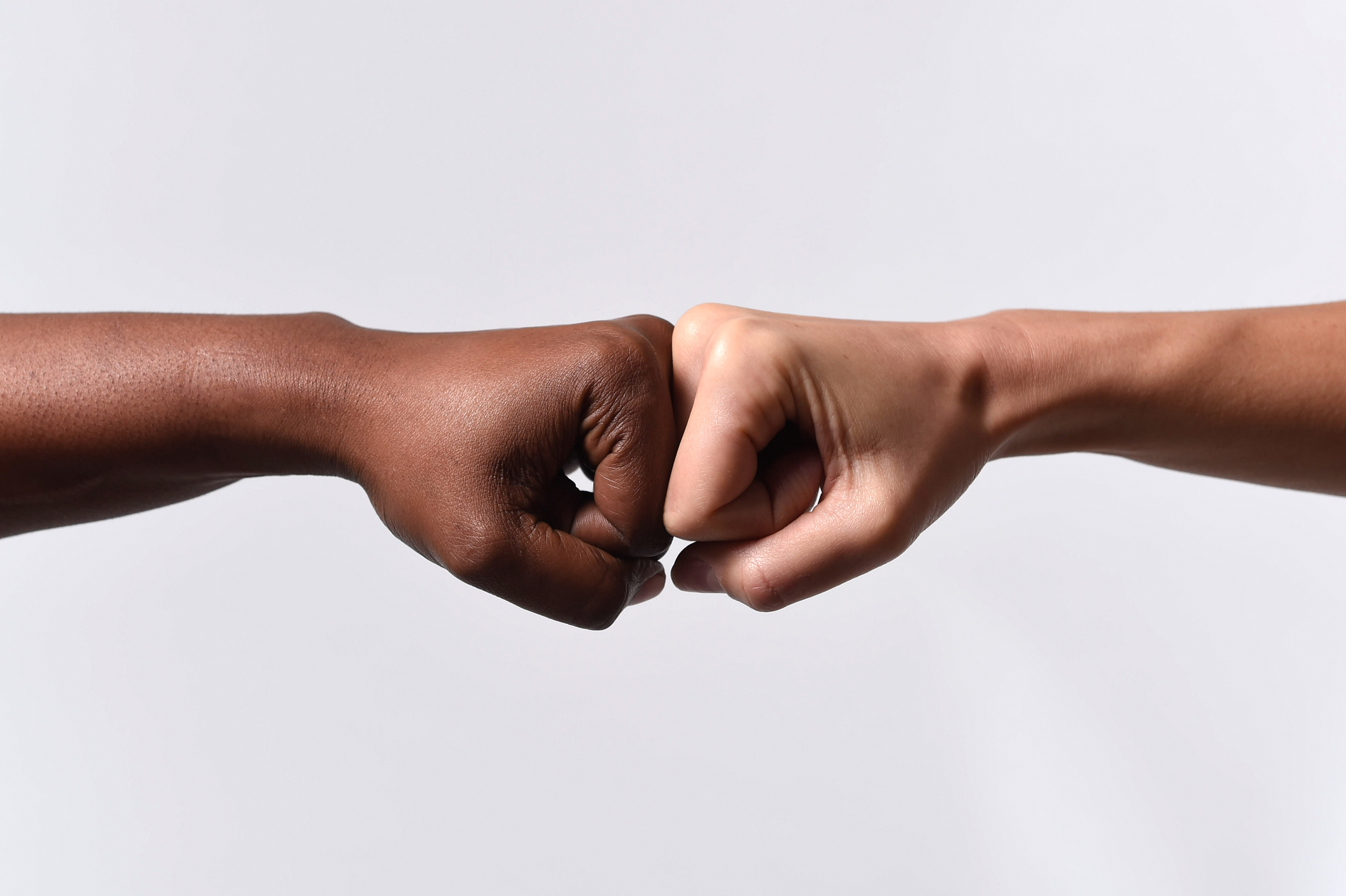How Do Black Americans Really Feel about the Phrase “It’s ok to be White”?

By Rachel Hartman, Jonathan Robinson, PhD, Aaron Moss, PhD & Leib Litman, PhD
Highlights
- In February 2022, Rasmussen Reports asked Americans if they agree with the statement “It’s ok to be White.” Only 53% of Black Americans said they agreed
- Rasmussen’s poll garnered national attention after “Dilbert” creator Scott Adams mentioned it in racist comments that later got Dilbert cancelled from hundreds of newspapers
- We perceived flaws in Rasmussen’s poll, so we conducted our own with 1,000 Black Americans
- Our results, which include an open-ended item asking people about their answer to the poll question, show many people were confused by Rasmussen’s question or hesitant to endorse a political slogan
- Several other questions assessing Black Americans’ sentiment toward White people show a high degree of acceptance
Have you ever heard the phrase “It’s ok to be White”? It’s a seemingly innocent statement, but its history is anything but. The phrase has been politically co-opted to stir up controversy. And recently, a poll by Rasmussen Reports found that only a slim majority of Black respondents agreed that “it’s ok to be White.”
Rasmussen’s poll became national news on February 22 when Scott Adams, creator of the popular comic strip “Dilbert,” discussed it on his YouTube show. Adams used the poll to claim that Black Americans are part of a hate group, and he urged White people to “get the hell away from Black people.” Since making those statements, hundreds of newspapers have dropped the Dilbert comic strip and a lot of media attention has focused on the Rasmussen poll.
How Rasmussen Conducted Their “It’s ok to be White” Poll
On February 13-15, Rasmussen Reports fielded a nationally representative poll of 1,000 American adults. They asked people “Do you agree or disagree with this statement: ‘It’s OK to be white’? Response options were “strongly agree,” “somewhat agree,” “not sure” “somewhat disagree” and “strongly disagree.”
Rasmussen found that 53% of Black respondents agreed with the statement, 26% disagreed (compared to 7% of White respondents), and 21% were not sure how they felt. By comparison, the numbers for White respondents were 81% agreeing, 7% disagreeing, and 13% who were not sure. We found these results surprising enough that we decided to conduct our own poll.
How CloudResearch Conducted a Follow-up Poll
In our follow-up poll, we specifically focused on Black Americans’ agreement with the statement “It’s ok to be White.” We asked people the exact same question as Rasmussen, but also several follow up questions, including an open-ended question where respondents could elaborate on their responses. We collected data from a large national sample of Black Americans (N = 1,000) using our Prime Panels platform and matched the sample to the Census on age, gender, and region—this contrasts with the Rasmussen poll that only included 130 Black Americans, which is not a large enough sample from which to draw conclusions about the broader population.
Within our survey, we included data quality measures to ensure respondents were taking the survey seriously and comprehending the questions. We asked respondents if they could run 2 miles in 2 minutes (anyone who said yes was excluded) and we examined respondents’ open-ended responses to remove anyone who responded nonsensically. This left us with 861 respondents.
What CloudResearch Found About Black Americans’ Feelings Toward the Phrase “It’s ok to be White.”
Our results stand in stark contrast to those of Rasmussen. The vast majority (67%) of Black respondents in our poll endorsed the statement “It’s ok to be White,” and 23% said they weren’t sure. This is compared to Rasmussen’s poll where 53% of Black respondents endorsed the statement and 21% said they weren’t sure.
The Rasmussen poll found that 26% of Black respondents disagreed with the statement “It’s ok to be White.” In our sample that number was less than 10%, which is closer to the percentage of White people in Rasmussen’s poll (6%) who disagreed with the statement. Furthermore, the open-ended responses revealed that many people who didn’t endorse the statement expressed confusion about it. They found the question odd and often wondered about its intentions.

Open-ended Responses Provide Critical Context
We read through all 861 open-ended responses and found several recurring themes.
Among respondents who agreed with the statement—most people in the poll—people said they did so because it’s okay to be any race or skin color, because skin color is not a choice, and because everyone should be proud of who they are. Many people emphasized that a person’s character is more important than race or skin color and said that discrimination based on race is wrong. Some responses mentioned that it is not fair to judge people based on their skin color, and that all races are equal. The overall sentiment among people agreeing with the statement is captured by respondents who wrote, “It’s ok to be white, black, whatever color or race/ ethnicity. What’s important is a person’s heart and mind” and “You should always be comfortable in your own skin no matter what color you are.”
What we found particularly revealing was that people who selected “not sure” tended to express the same sentiments as those who answered that it is OK to be White. For example, people who responded, “not sure” to the poll question later went on to write in their open-ended response that, “It is OK to be white”, “It is OK to be any color”, and “Color should not matter in this day and age we are all the same inside.” Why does it appear these people are contradicting themselves? We grouped their responses into three specific reasons.
The first reason was uncertainty about the meaning of the question. For example, respondents wrote, “I don’t understand the question and what is meant by it”, “don’t know what that means”, and “I need more content [sic] to that question as that could mean a lot of things based on how said.”
The second reason was that people didn’t like the question because they perceived it as political. So, while people thought it is ok to be white, they were responding to the slogan rather than the question itself. These respondents wrote things like, “It seems like a race debate baiting question and I don’t like that,” “Because it seems like it is racists [sic],” and “The statement makes me uncomfortable.”
“It seems like a race debate baiting question and I don’t like that”
The third reason was that many respondents interpreted the question as asking them about whether they personally are ok with being White. Due to this misunderstanding, people said they couldn’t answer that question because they were Black: “I’m not sure what it’s like to be white because I’m not white”, “Because I am not white so I cannot answer that question,” “Because I’m not experienced living as white, therefore my answer won’t be accurate or honest,”
Perhaps most interesting, we found that even among the small group of people who disagreed with the statement “It’s ok to be White” many expressed the same positive sentiments toward being white, or any other color, in their open-ended responses. For example, people wrote “Because it’s just the color,” “People put this stigma on color smh,” “Because Color doesn’t change the fact that we are all human beings,” “What does it mean it’s okay to be white? I don’t understand that it should be ok to be any color not just white.”
Like those who said they were “not sure” to the poll question, many people who disagreed said they did so because they did not like the political slogan rather than because they felt it actually is not OK to be white. Many people criticized the slogan as racist. “That was a very weird question,” “Because it seems racist,” “It’s a stereotypical racist statement,” “Being black I find it to be somewhat offensive,” “Because it’s offense to me… try being a person of color and having to deal with things that we have to deal with.”
Black People’s Overall Sentiment Toward White People is Positive
Every pollster will tell you that it matters how questions are asked. Given the uncertainty and loaded history surrounding the statement “it’s ok to be White” we asked people several other questions that assessed feelings toward White people.
Across all our questions, disagreement was consistently in the single digits. These items included statements such as “There’s nothing inherently problematic about being white,” (66% agreed) “There’s no reason to feel ashamed or guilty for being white,” (77% agreed) “Being white is a normal and valid aspect of one’s identity,” (81% agreed) and “White people deserve to be treated with the same dignity and respect as anyone else” (85% agreed). The average approval of White Americans by Black respondents in our survey across these four items was 4.17, on a scale of 1 (strongly disagree) to 5 (strongly agree).

Finally, we asked two questions that behavioral scientists routinely use as a measure of outgroup prejudice. We found most Black Americans (75%) would be comfortable with a close family member marrying a White person and would similarly be comfortable (82%) with a White family moving in next door.
The Impact of Political Slogans and the Importance of Clear Language
Overall, it’s safe to say that the phrasing in Rasmussen’s survey had a significant impact on the responses. The loaded history of the slogan included in their polling question caused many participants to be skeptical of expressing approval and many others were simply unsure how to respond. Many people disapprove of the slogans “Black Lives Matter” or “All Lives Matter” while still very much endorsing the fact that Black lives, and all lives, matter. Political slogans carry more meaning than the actual words being used, and the same is true for “It’s ok to be White.”
In our study, using appropriate methods, we see a clearer picture of how Black Americans feel about the statement—not the slogan, but the literal meaning of the words. What we found is that only a very small handful of respondents expressed genuine disagreement with the statement and this level of disagreement was virtually indistinguishable from the rate of disagreement among Whites in Rasmussen’s poll. So, in case you had any doubt, the overwhelming sentiment expressed in our study is that Black people think it is a-okay to be White.

